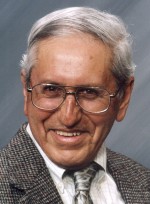The Gospel tells us that Jesus went out into the desert to pray. It is a good practice for all of us, even if our journey is to a metaphorical desert. The desert, with all its loneliness, purifies what the metropolis contaminates.
I like to spend time in the high desert of New Mexico, the foothills of the Sangre de Cristo Mountains, where I grew up. During my sojourn I go to the church where I was baptized and confirmed, Our Lady of Guadalupe in Sapello, a hamlet where two small streams with headwaters in the Pecos wilderness emerge from the hills into endless plains.
The parish was established in 1859. The arrival of the first pastor, Father Francis Jouvenceau, was a miracle for the settlers, who had “directed their lonely prayers, processions and priestless Lenten observances” with that hope, according to a brief historical sketch of the parish.
However, nothing is permanent — one of the lessons of the desert. Ten years before the parish could celebrate its 100th anniversary, it was demoted to a mission. The parishioners were not disheartened. Alongside the collapsing old church, they built “a humble edifice to stand in its stead, to house the Christian’s treasure to be the bark, the symbol of the visible unity of one Christian to another in the fellowship born of God.”
[hotblock]
Last December, the mission church celebrated its 65th anniversary.
Now, worship takes place only once month. A permanent deacon comes on the second Sunday to lead a liturgy lacking only the consecration to be a Mass. I like to go there because I find a palpable faith and unity demonstrating that time has not erased the faith that led its pioneers to persevere in the past.
On the other Sundays of the month, the people often follow the deacon to other mission chapels tucked into the hills and valleys of the far-flung former Sapello parish.
Now, of course, the region is less densely populated, as many moved away during and after World War II. But those who remain are proud of the faith of those who left.
“Our way of life is quite distinct from that of the city dweller or the town folks,” states the brief history prepared by Orlando Martinez and his family.
“Our life is one of hard work and prayer and dependence on divine providence, with little time for play. Our social life is expressed more by our willingness to lend a helping hand to a neighbor in need, be he sick, or in want, or just simply stuck in the mud. We are so dependent on divine providence that our thoughts are constantly directed to (God).”
The cities give us the illusion that we are in control. The desert teaches us that we are not.
PREVIOUS: Supreme Court can’t rule on sacrament of marriage
NEXT: How a 1950s theologian formed the basis of ‘Laudato Si’




Share this story